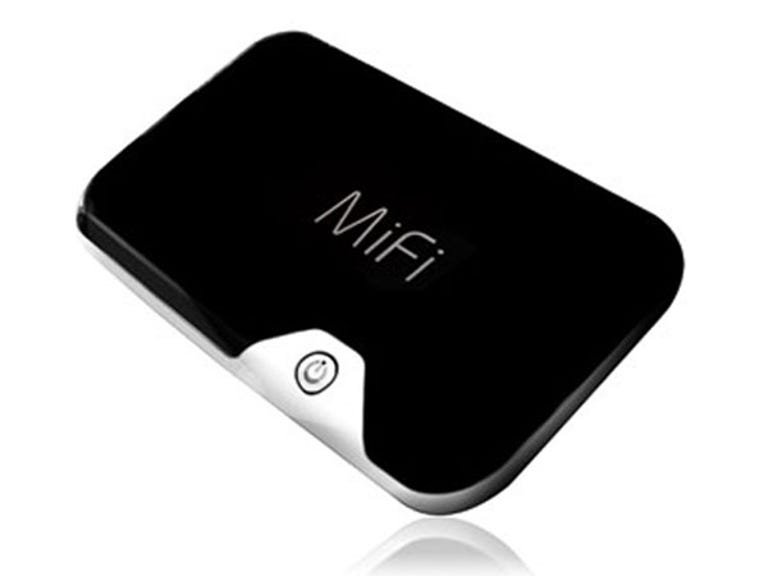 Why You Can Trust CNET
Why You Can Trust CNET Internode MiFi review: Internode MiFi
Internode's MiFi 3G modem/router works quite well, but carrier issues and high pricing are a big downside.
The Good
The Bad
The Bottom Line
Design
Internode's entry into the personal Wi-Fi-enabled 3G modem category carries about the least catchy name possible, as it's labelled simply as the "MiFi", a title used often for this entire category of devices. Then again, if you can own an entire category by name alone, it's probably not a bad marketing strategy. The MiFi device itself is small (62x98x15.3mm) and light (81g) and slips into the pocket in much the same way a mobile phone does. That's both a plus and a minus, as while it's highly portable, it also means it's pretty easy to mistake it for your actual mobile when digging through your pockets. Internode sell the MiFi in white or black. Unsurprisingly, those options give you a modem router in white or ... (you guessed it) black.
The MiFi does have the advantage of simplicity. It features a single button that glows when you switch it on. From there, the MiFi handles connection to the wireless carrier and setting up a WEP-protected Wi-Fi network for you. There's no other buttons to push or settings to tweak, at least in theory.
Features
Internode's an ISP, not a hardware manufacturer, so the MiFi isn't a unique design. It's actually a Novatel MiFi 2352. That's an HSDPA/HSUPA capable modem with a top speed of 7.2Mbps down and 5.76Mbps up. On the wireless front, the MiFi is 802.11b/g capable only. It's a compromise not having wireless-N, but then this is really a personal modem router rather than something you could reasonably expect to run an entire home on. The internal battery is a 1530mAh Lithium-ion that sits above the SIM holder. A microSDHC slot also makes this a tiny storage router for any connected client. You're not going to be able to serve data to absolutely everybody, however, as the MiFi has a hard limit of only five clients.
Performance
Internode supplied us with a presumably standard set-up sheet for the MiFi modem/router, which includes simple directions on setting up wireless security. It goes without saying that this is a good idea, unless you like giving away free (to others, but valuable to you) data. The web configuration interface isn't all that friendly, but beyond initial set-up you're unlikely to need to consult it much at all. With only one button you certainly can't tinker with having Wi-Fi on or off as you can on the Virgin MiFi product. It's either all on or all off, and that's all you get.
As with the recently reviewed Virgin Mobile Wi-Fi modem, it's only when you're using the MiFi that you appreciate the flexibility that it offers you over a standard USB or ExpressCard modem. It's easy to start-up thanks to the single button design, and the ability to add Wi-Fi to things like iPhones opens up a number of possibilities such as on-the-go Skype and larger App updates. Come mid-year, you could pair it up with a Wi=Fi iPad to turn it into a virtual 3G iPad, at least in theory.
Internode's wireless carrier of choice for the MiFi is Optus, and that brings with it a number of challenges. To put it politely, Optus' 3G network performance in some areas hasn't exactly been what customers have hoped for, with plenty of anecdotal reports of outages, terrible slowdowns and what appears to be cell overcrowding in specific areas. The MiFi has to contend with all of that on exactly the same network, so if you know already that Optus reception is woeful where you are, then the MiFi's not for you.
Reception is always going to make any kind of bandwidth test very subjective. We weren't surprised to never hit the 7.2Mbps maximum anywhere we tested, but then these theoretical maximums are never really pushed by any modem. Testing across various venues in Sydney we managed between 2-3Mbps down and 1-1.5Mbps up on average, which tallies at least with Internode's own claims of 0.5-2Mbps likely speed.
For what it's worth, Internode sells the MiFi unlocked, so you could take it to other carriers, although it's only rated for 850MHz operation under EDGE/GPRS, so you'd still need to be in a good 2100MHz reception area. Pricing is at AU$349 as an introductory offer, AU$399 thereafter or AU$299 on a 24-month contract. That's a little pricey compared to the competition; Virgin's MiFi offering is only AU$199 outright.



